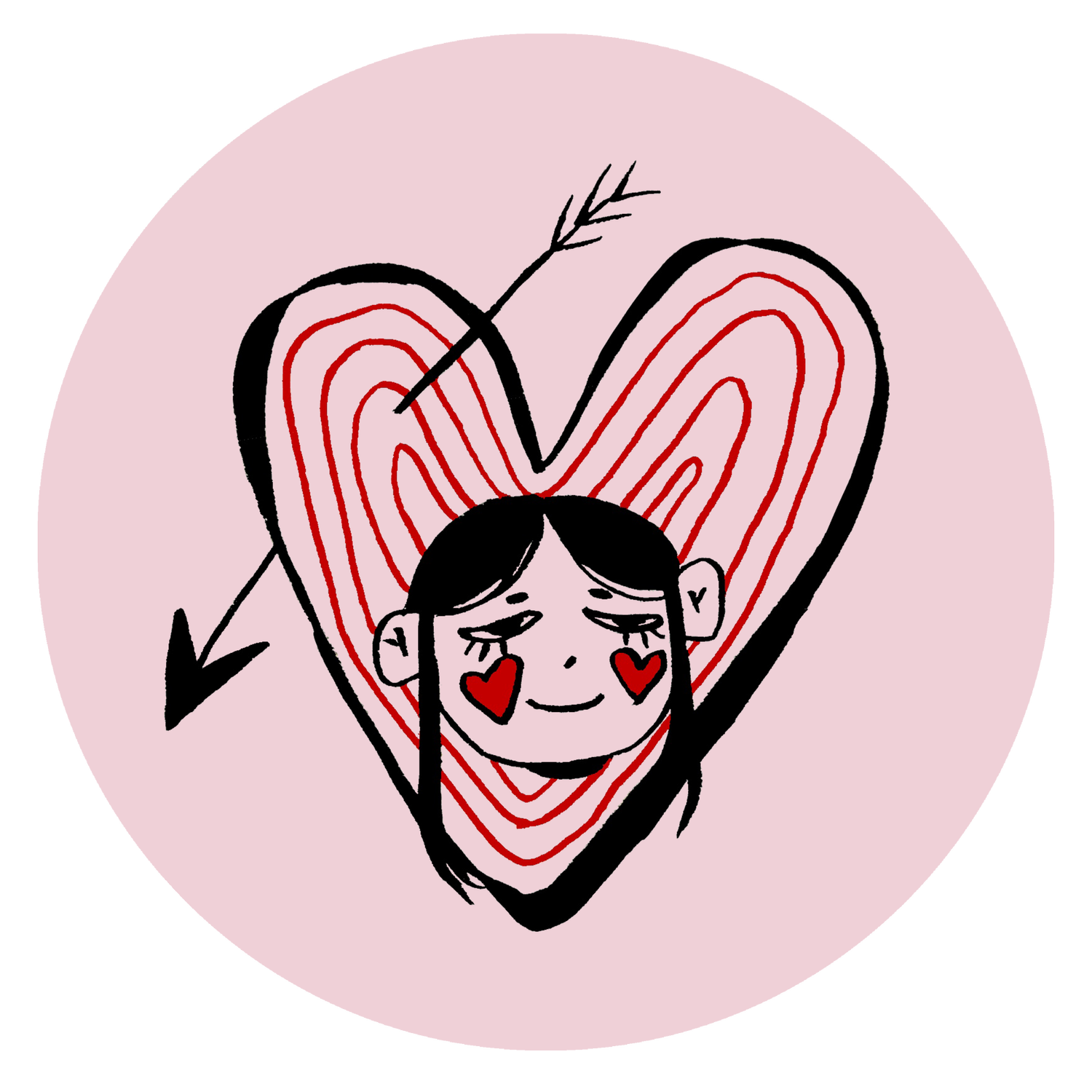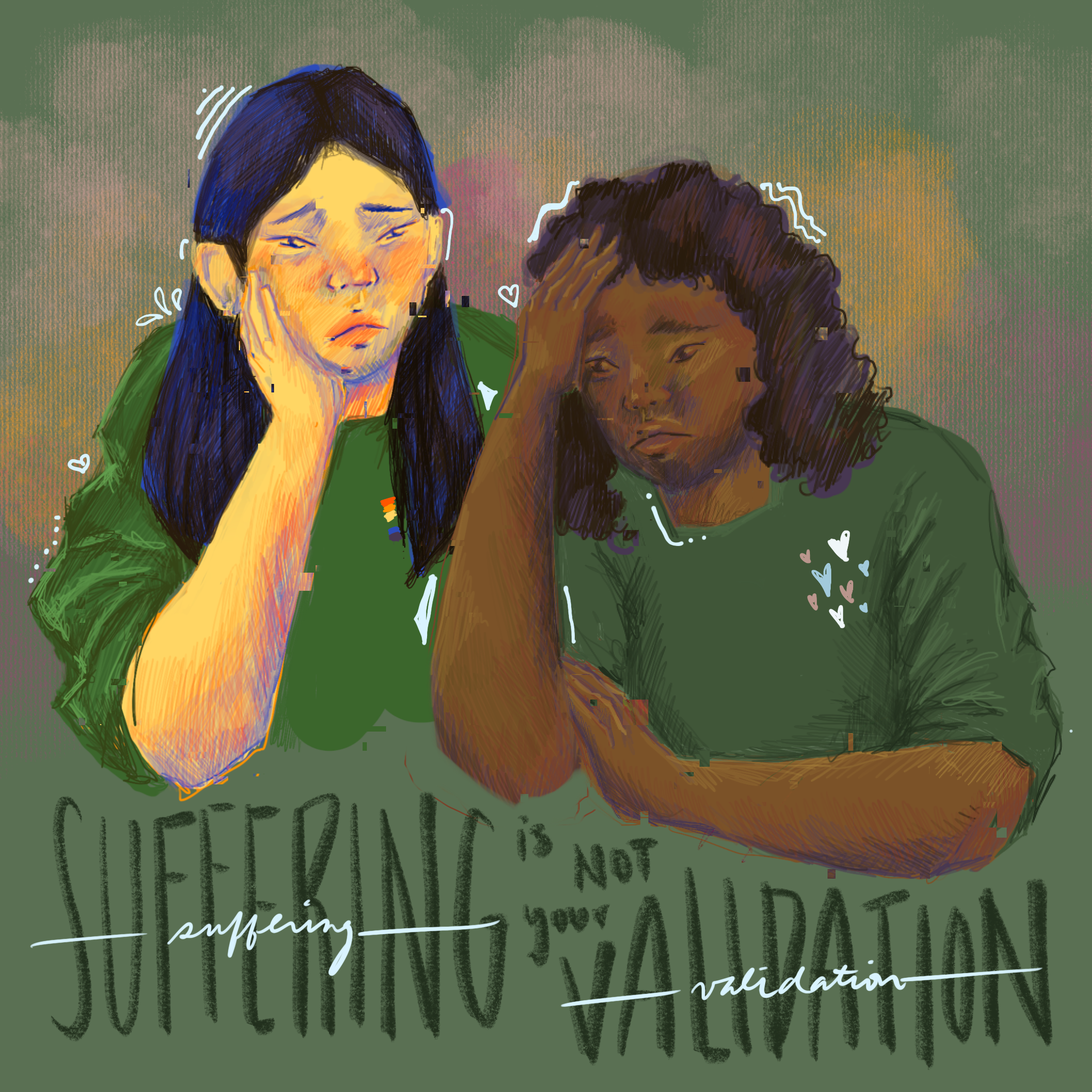suffering is not your validation
Illustration by Lorena Horng
Growing up on the internet in the 2010s, I have seen no shortage of social media posts glorifying suffering in conversations about privilege, mental health, and general life experiences. For the most part, this is a recognized problem. It is common knowledge that pain should not be treated as a point of pride, but knowing that does not eliminate the unconscious influence of that kind of culture on the individual.
In some online POC or LGBT communities, being privileged is seen as an inherently bad thing. Oftentimes, these communities conflate healing with putting down more privileged people and wear suffering like badges of pride, unknowingly establishing a threshold of pain that one must endure on an individual basis before they are officially allowed into a circle of fellow marginalized people. One may feel that they are undeserving of a life with less pain, or guilt for being in a more accommodating environment because other marginalized people do not have that opportunity.
I am here to tell you that that should not happen. While we should all recognize our privileges, it should not be a wall that prevents us from being authentic in our identities. If our environments make us think our identities are invalid because we have not suffered enough to earn them, we will believe that suffering is the only thing that makes them valid. I believed for a very long time that because I was not called slurs to my face growing up, I was less of a queer Chinese-American than others who shared that identity. This thought was rooted in the idea that in order to be a “true” LGBT POC, I had to endure multiple forms of prejudice, including but not limited to jabs at my identity and being denied academic or professional opportunities.
This way of thinking, however accidental it might be, is problematic. After all, suffering is not the only part of being a POC or LGBT person. Joy should be valued the same as — if not more than — pain within the minority experience. It is an equally important part of the series of events that constitutes the life of a minority. To give my own perspective on human life, we are not born to endure pain for the entire duration of our lives, so suffering should not be the only thing that validates identity.
The forced connection between suffering and being a POC or LGBT person turns the minority experience into a life lived in order to suffer, making all joy and healing secondary to pain. The LGBT identities, for example, would boil down to all of the injustices endured by community members even though that is not everything that factors into being LGBT. We have Pride to celebrate — well, LGBT pride! And along with honoring the accomplishments of queer activists, it demonstrates queer joy. Likewise, other marginalized people probably have at least one thing that can bring them joy. For me, I know that being Chinese-American does not only involve being the victim of racism. It also means that I have a community of Chinese people in my neighborhood with whom I can celebrate holidays. These things do not and should not have to be overridden by pain.
The “tortured artist” stereotype is a very good example of the kind of thought process that incurs the glorification of suffering. The stereotype has evolved into an informal instruction manual on how to be “good.” Many well-known writers and artists have been tortured artists, like Vincent Van Gogh, Edgar Allen Poe, and Sylvia Plath; in fact, some of Plath’s most famous works originated from her unhappiness. This kind of precedent displays pain as a part of a creator’s development. How much must we suffer in order to create heartfelt works? How much pain must we endure before it makes us good? If Sylvia Plath had to live such a painful life to write “Lady Lazarus,” what must we endure before we are worthy of the same praise?
For some minorities, the question may turn into the thought that they need to suffer more in order to empathize with others of their same minority status, or that they need to suffer more to eliminate the guilt they have for being more privileged. Obviously, most people may not think these exact words and may not even realize that this is what they are thinking, but the idea of it is common — more common than you think. There will always be people better or worse off, and most people will feel at some point that they do not deserve to be better off than someone else. I, at least, have been there, and I do not doubt that some of you have as well.
However, you are you. You have every right to your identity and uninhibited joy, regardless of your experiences, because of your humanity. You, like everyone else, are allowed to have things. Whether that be joy, a painless life, or something else, you can and should have it — without guilt.

